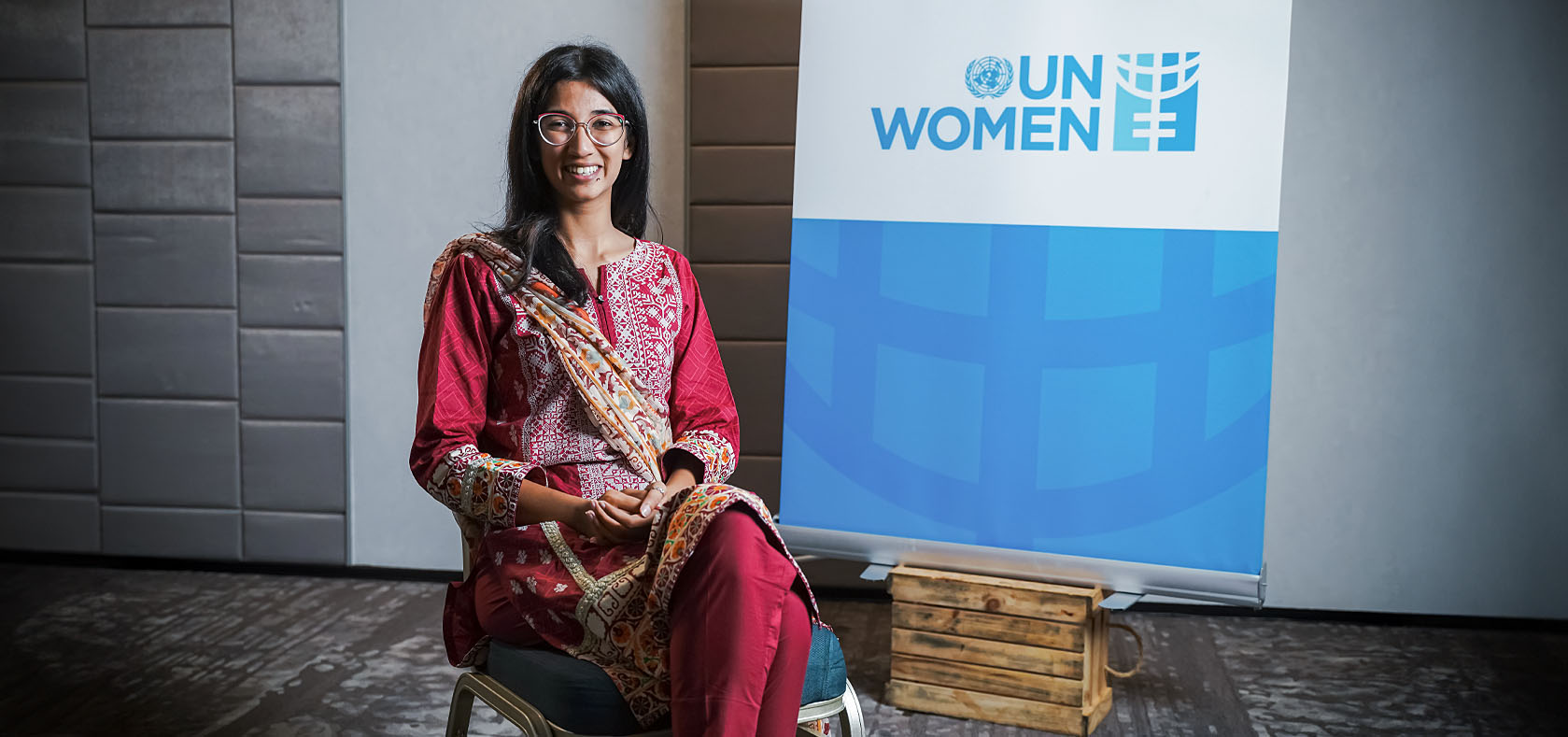In the words of Ameera Adil: “My goal at COP28 was to shed light on women’s experiences”
Date:
Author: Shadab Memoon Zaman

Ameera Adil is a feminist climate activist and educator. She is the founder of the Pakistan Youth Climate Network and 8clim.org, an education and science communication initiative that raises awareness on climate change. She also heads the Office of Sustainability at Pakistan’s National University of Science and Technology. With support from UN Women, she recently attended the UN Climate Change Conference (COP28) in Dubai, UAE, to advocate for the women, peace and security agenda in the context of climate change and complex crises.

I’ve been actively engaged in climate change and sustainability efforts for about eight years now. My focus has been on creating awareness, fostering understanding, and contributing to the discourse on environmental issues with a specific emphasis on sustainability.
My journey into climate change awareness began during my studies in environmental engineering. I noticed a significant void in content that spoke to the experiences of individuals in South Asia, particularly in Pakistan. Most climate change information was steeped in a Western context, making it challenging for me to connect with the issues on a personal level.
Motivated by this realization, I embarked on a path of self-directed learning about climate change. I wanted to synthesize information that not only highlighted the global dimensions of climate change but also underscored its local impact, especially in developing nations like Pakistan.
This led me to create content tailored to the South Asian narrative, emphasizing the unique challenges and opportunities in our region. The aim was to make climate change information more relatable and accessible, fostering a deeper understanding of its urgency within our specific socio-economic and environmental context.
Climate change, in my view, acts as a threat multiplier. It doesn't occur in isolation but rather amplifies existing societal challenges. In regions where issues such as peace and security, as well as gender inequality, are already prevalent, climate change exacerbates these problems. For instance, in a society where women are marginalized, climate change provides additional avenues for adverse impacts on them, influencing peace and security dynamics.
When we discuss climate-related events like floods, it's crucial to recognize their interconnectedness with issues of gender, peace and security. By unifying action on gender equality, climate resilience and peacebuilding, we can strategically mitigate the losses and damages inflicted by climate change. This involves not only adapting to the changing climate but also proactively focusing on sustainable development to create resilient communities better equipped to face the challenges posed by climate change.
“By unifying action on gender equality, climate resilience and peacebuilding we can strategically mitigate the losses and damages inflicted by climate change.”
— Ameera Adil, Head, Office of Sustainability, National University of Science and Technology, Pakistan
Engaging with UN Women has been pivotal for me in delving into the intersectionality of women, peace, security and climate change. It has provided a crucial platform beyond the confines of existing organizations, opening new perspectives and avenues of work that were previously unexplored.
This collaboration has been instrumental in broadening my understanding and contributing to a more comprehensive approach to addressing the interconnected challenges of gender, peace, security, and climate change.
While discussions around climate change are widespread, a significant challenge lies in the language barriers and diverse platforms that often render certain voices unheard. For instance, communities may understand that climate change is affecting their crops, but articulating these impacts in a compelling manner becomes a hurdle. My goal is to bridge this gap by refining the communication aspect, ensuring that critical stories are not only heard but also resonate effectively, contributing to a more inclusive and impactful dialogue on climate change.
There’s an urgent need to document the nuanced stories of women affected by natural events. My goal is to bring forth these voices at COP28, shedding light on their experiences and advocating for a more inclusive and comprehensive approach to climate change discourse.
While I’ve collaborated with international media for the purpose of publishing, my hands-on actions and projects have been centred within Pakistan. This allows me to directly contribute to, and address, the unique challenges faced by the country in the realm of climate change and sustainability. My primary focus is on the Sindh and Gilgit-Baltistan regions, particularly engaging with young men and women.
Certainly, I see an opportunity for positive change. Climate change, as a catalyst, has the potential to drive social development projects. I’m particularly optimistic about leveraging the energy and passion of the younger population as a driving force for transformative change. By channeling this enthusiasm, we can initiate impactful initiatives that not only combat climate change but also contribute to broader societal development.”
Ameera Adil participated in two side events at COP28 in December 2023, co-organized by UN Women:
- What’s your Peace? Watch COP28 Finland Pavilion event livestream recording
- Price for Peace, Pakistan Pavilion
Women, Peace and Security agenda
UN Women is the lead UN entity on the WPS agenda in the Asia-Pacific region and supports governments and civil society to develop and implement WPS National Action Plans. More countries are now mentioning security risks, such as climate change, in their National Action Plans.
Visit: